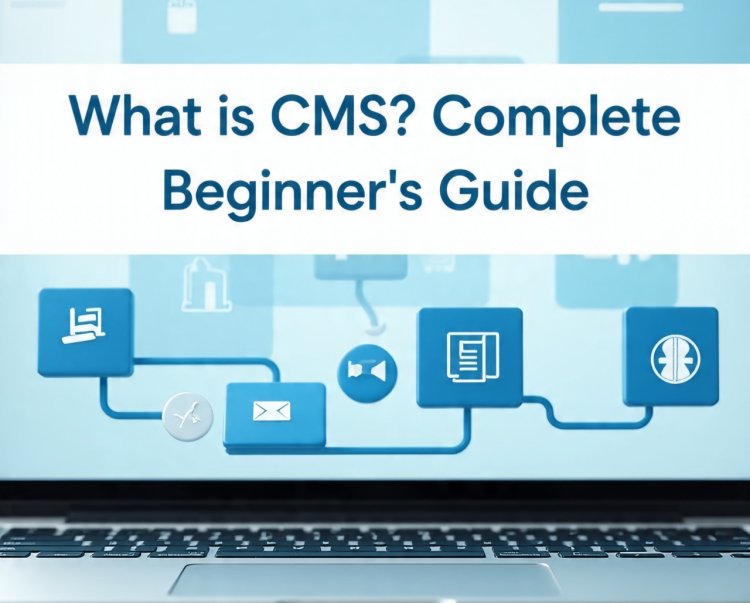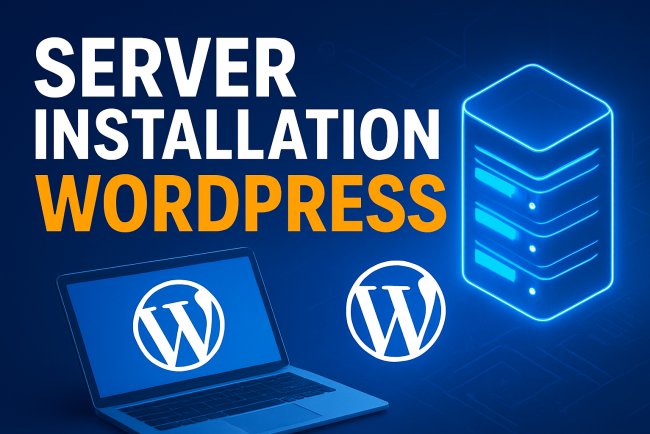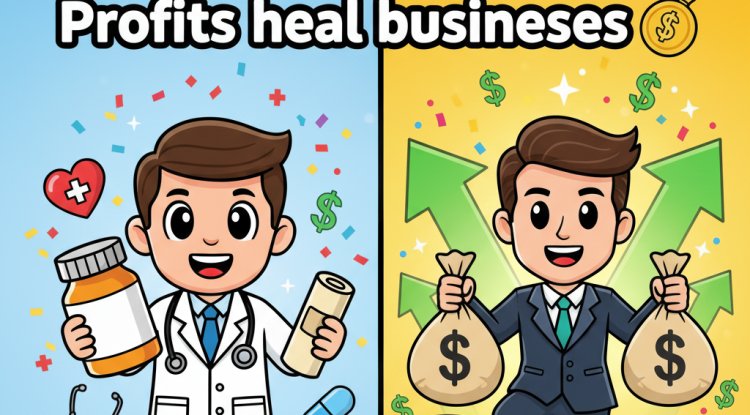What is CMS (Content Management System)? – Overview
=>What is CMS? A Content Management System is like having a personal web developer in your pocket - it lets you create and manage websites without coding, just like using Microsoft Word but for websites. Key Points Covered: - Simple Definition: CMS = Easy website building tool (no technical skills needed) - Popular Examples:WordPress, Shopify, Wix - each serving different needs - Main Benefits: Anyone can use it, teams can collaborate, built-in SEO tools, grows with your business - Perfect For:Blogs, online stores, portfolios, business websites Bottom Line: CMS transformed website creation from rocket science to smartphone-simple. Whether you're a baker wanting to showcase daily specials or a corporation managing complex content, there's a CMS that fits. The hardest part is just getting started - once you try it, you'll wonder why you waited so long. The Takeaway: Pick any CMS platform, spend 30 minutes exploring it, and you'll discover that buildin

Imagine trying to build a house without tools – you'd be stuck mixing cement with your bare hands and hammering nails with rocks. That's exactly what creating websites was like before Content Management Systems came along. Let's explore how CMS transformed the digital world and why it matters to you.
Table of Contents
- Introduction to CMS
- Core Definition
- Key Components of a CMS
- Types of CMS
- Popular Examples of CMS Platforms
- Benefits of Using a CMS
- Use Cases of CMS
- CMS vs. Website Builders
- Choosing the Right CMS
- Future of CMS
- Conclusion
1. Introduction to CMS
What Does CMS Stand For?
CMS stands for Content Management System. Think of it as a digital Swiss Army knife that helps you create, manage, and publish content on the internet without needing to be a coding wizard.
Why CMS Matters in the Digital Age
Remember when creating a website required you to write endless lines of code that looked like hieroglyphics? Those days are long gone! In today's world, where everyone from your grandmother to your local pizza shop needs an online presence, CMS has become the great equalizer. It's like having a personal web developer in your pocket, available 24/7.
The Digital Reality Check:
- Over 1.7 billion websites exist today
- 43% of all websites use WordPress (a popular CMS)
- Small businesses with websites grow 40% faster than those without
2. Core Definition
What is a Content Management System?
Imagine your favorite word processor – Microsoft Word or Google Docs. You can write, edit, format, and save documents without knowing how the software actually works behind the scenes. A CMS works the same way, but for websites.
In Simple Terms: A CMS is software that lets you build and manage a website through a user-friendly interface, just like using any app on your phone. No coding required, no technical degree needed.
How CMS Works: Basic Functionality Explained
Think of a CMS like a restaurant kitchen:
- The Chef (You): Creates content using simple tools
- The Kitchen Staff (CMS Backend): Processes and organizes everything
- The Waiter (Publishing System): Delivers the final product to customers (website visitors)
- The Restaurant (Database): Stores all ingredients (your content) safely
The Magic Behind the Scenes:
- You write a blog post in an editor that looks like Microsoft Word
- The CMS stores it in a database (like a filing cabinet)
- When someone visits your website, the CMS pulls the content and displays it beautifully
- All of this happens in milliseconds!
3. Key Components of a CMS
Content Creation Tools
These are your digital writing tools – imagine having a word processor, photo editor, and video uploader all built into one dashboard. You can:
- Write and format text with bold, italics, and colors
- Upload images and videos with drag-and-drop simplicity
- Create tables, lists, and embed social media posts
- Preview exactly how your content will look before publishing
Real-World Example: Writing a blog post feels just like composing an email – that familiar and easy!
Content Storage (Databases)
Think of this as a massive, organized digital warehouse where all your content lives. Every photo, every word, every page gets stored systematically. It's like having a librarian who never sleeps, organizing everything perfectly so it can be found instantly.
What Gets Stored:
- All your text content
- Images, videos, and files
- User information and comments
- Website settings and customizations
Content Publishing System
This is your content's journey from creation to the world. Imagine having a personal assistant who takes your rough draft and presents it professionally to the world. The publishing system:
- Formats your content beautifully
- Makes sure it looks good on phones, tablets, and computers
- Handles all the technical stuff behind the scenes
- Updates your website instantly when you hit "publish"
User Roles & Permissions
Just like in any organization, different people have different levels of access. Think of it as a digital office building with different security clearances:
- Administrator: The CEO who can access everything
- Editor: The manager who can create and edit content
- Author: The employee who can write but needs approval to publish
- Subscriber: The visitor who can only read and comment
4. Types of CMS
Traditional CMS
This is like a complete, ready-to-move-in house. Everything's connected and works together seamlessly. WordPress, Drupal, and Joomla are perfect examples.
Characteristics:
- All-in-one solution
- Easy to set up and use
- Perfect for beginners
- Like buying a complete smartphone rather than assembling parts
Best For: Bloggers, small businesses, anyone wanting a straightforward solution
Headless CMS
Imagine having a powerful engine (content management) that can power different types of vehicles (websites, mobile apps, digital billboards). The "head" (website display) is separate from the "body" (content management).
Think of it like: A pizza kitchen that can deliver to restaurants, food trucks, and home delivery – same great pizza, different ways to serve it.
Best For: Developers who want flexibility, companies with multiple digital platforms
Decoupled CMS
This is the middle ground – like having a house where you can easily renovate the front while keeping the back structure intact. You get some flexibility without complete separation.
Best For: Businesses that want some customization without full complexity
5. Popular Examples of CMS Platforms
WordPress
The People's Champion – Powers 43% of all websites! It's like the iPhone of CMS – popular, user-friendly, and has an app (plugin) for everything.
Perfect For:
- Bloggers and content creators
- Small to medium businesses
- Anyone wanting thousands of free themes and plugins
Fun Fact: From personal blogs to major news sites like The New York Times blog, WordPress handles it all!
Joomla
The Balanced Choice – More powerful than WordPress for complex sites, but still user-friendly. Think of it as the Android of CMS – flexible and customizable.
Perfect For:
- Medium to large businesses
- Social networking sites
- E-commerce with complex requirements
Drupal
The Developer's Dream – Extremely powerful and secure, used by governments and large corporations. It's like the Linux of CMS – incredibly capable but requires more technical knowledge.
Perfect For:
- Large enterprises
- Government websites
- Sites requiring high security
Shopify
The E-commerce King – Built specifically for online stores. It's like having a complete shopping mall management system.
Perfect For:
- Online stores of any size
- Businesses wanting to sell products quickly
- Anyone who wants payment processing built-in
Wix
The Visual Artist – Drag-and-drop website building made simple. It's like having digital Legos for creating websites.
Perfect For:
- Complete beginners
- Artists and creatives
- Small businesses wanting quick results
Magento
The E-commerce Professional – Powerful e-commerce platform for serious online businesses. Think of it as the industrial-strength version of online selling.
Perfect For:
- Large e-commerce businesses
- Companies with complex product catalogs
- Businesses needing advanced e-commerce features
6. Benefits of Using a CMS
Ease of Use (No Coding Required)
Remember when you needed to call a mechanic just to change your car's radio? CMS eliminated that problem for websites. You can now:
- Create pages as easily as writing a document
- Change your website's appearance with one click
- Add new features without touching code
- Fix problems yourself instead of calling a developer
Real Impact: A local bakery owner can update their menu, post daily specials, and showcase new cakes – all during their lunch break!
Collaboration & Multi-User Access
CMS turns website management into a team sport. Multiple people can work on the same website without stepping on each other's toes:
- Writers can draft articles
- Editors can review and improve content
- Designers can update visuals
- Managers can approve everything
Real-World Example: A marketing team of 10 people can all contribute to the company blog simultaneously, with proper approval workflows in place.
SEO & Marketing Tools
CMS platforms come with built-in helpers that make your website more discoverable on Google. It's like having a personal SEO consultant:
- Automatic optimization suggestions
- Easy social media sharing
- Built-in analytics to track visitors
- Email marketing integration
Scalability and Flexibility
Your CMS grows with your business. Start with a simple blog and expand to include:
- Online store functionality
- Member-only areas
- Event booking systems
- Multi-language support
Think of it like: Starting with a small apartment and being able to add rooms as your family grows, without moving houses.
7. Use Cases of CMS
Blogging and News Websites
CMS makes publishing as easy as posting on social media. Journalists and bloggers can:
- Publish articles instantly
- Schedule posts for optimal times
- Manage reader comments
- Organize content by categories and tags
Success Story: Many successful bloggers started with free CMS platforms and built million-dollar businesses!
E-commerce Stores
Transform any website into a complete online store:
- Product catalogs with photos and descriptions
- Shopping carts and secure checkout
- Inventory management
- Customer accounts and order history
Real Impact: Small artisans can compete with big retailers by showcasing their products professionally online.
Portfolios and Personal Websites
Perfect for showcasing your work:
- Artists displaying their creations
- Photographers sharing their best shots
- Professionals building their personal brand
- Students creating impressive online resumes
Corporate and Government Websites
Handle complex organizational needs:
- Multiple departments with different content
- Secure document sharing
- Public information portals
- Event management and announcements
8. CMS vs. Website Builders
Key Differences Explained
CMS (Like WordPress):
- More like buying a plot of land and building your dream house
- Unlimited customization possibilities
- Requires some learning but offers more power
- Can handle any type of website
Website Builders (Like Wix, Squarespace):
- More like buying a pre-built house and decorating it
- Limited but very user-friendly customization
- Perfect for beginners
- Great for simple websites
When to Choose Which
Choose CMS When:
- You want complete control over your website
- You plan to grow significantly
- You have specific functionality requirements
- You don't mind a small learning curve
Choose Website Builders When:
- You need a website up quickly
- You're not tech-savvy and don't want to learn
- You have a simple website with basic needs
- You prefer paying monthly for everything included
9. Choosing the Right CMS
Factors to Consider
Budget Considerations:
- Free Options: WordPress.org, Joomla (you pay for hosting)
- Paid Options: WordPress.com, Shopify (monthly subscriptions)
- Hidden Costs: Themes, plugins, professional help
Technical Skill Level:
- Beginner: WordPress.com, Wix, Squarespace
- Intermediate: WordPress.org, Joomla
- Advanced: Drupal, custom solutions
Website Purpose:
- Blogging: WordPress
- E-commerce: Shopify, WooCommerce
- Portfolio: WordPress, Wix
- Enterprise: Drupal, custom CMS
Scalability Needs:
- Small Projects: Any CMS works
- Growing Business: WordPress, Joomla
- Large Enterprise: Drupal, custom solutions
Open Source vs Proprietary CMS
Open Source (Free but You Manage Everything):
- Like owning a car – you're responsible for maintenance
- Complete freedom and control
- Large community support
- Examples: WordPress, Joomla, Drupal
Proprietary (Paid but Managed for You):
- Like leasing a car – maintenance included
- Limited customization but hassle-free
- Professional support included
- Examples: Shopify, Wix, Squarespace
10. Future of CMS
AI Integration
The future of CMS is getting smarter:
- AI Content Creation: Automated writing assistance and content suggestions
- Smart SEO: AI-powered optimization recommendations
- Personalized Experiences: Content that adapts to each visitor
- Automated Translations: Instant multi-language websites
What This Means: Creating professional content will become as easy as having a conversation with an AI assistant.
Omnichannel Content Delivery
Your content will seamlessly flow everywhere:
- Websites adapt perfectly to any device
- Content automatically formats for social media
- Voice assistants can read your articles
- Smart TVs can display your content
Enhanced Security Features
Future CMS platforms will be Fort Knox-level secure:
- Automatic threat detection and prevention
- Biometric login options
- Blockchain-based content verification
- AI-powered backup and recovery
11. Conclusion
Summary of CMS Importance
Content Management Systems have democratized the internet. They've turned website creation from a specialized skill into something as accessible as using a smartphone. Whether you're a small business owner, a creative professional, or running a large organization, CMS provides the tools to establish and maintain a professional online presence.
Final Thoughts on Using a CMS
The beauty of modern CMS platforms lies in their ability to grow with you. You can start simple and expand as your needs evolve. The key is to begin – choose a platform that matches your current needs and comfort level, then learn and grow from there.
Remember: Every expert was once a beginner. The sooner you start exploring CMS platforms, the sooner you'll realize that managing a website isn't rocket science – it's more like learning to ride a bike. Once you get the hang of it, you'll wonder why you ever thought it was difficult.
Your Next Step: Choose one CMS platform mentioned in this guide and spend just 30 minutes exploring its dashboard. You'll be amazed at how intuitive and powerful these tools have become.
The internet is waiting for your unique voice and perspective. A CMS is simply the megaphone that helps you share it with the world.
What's Your Reaction?






















